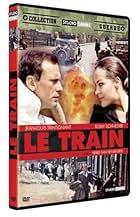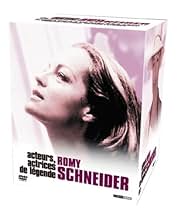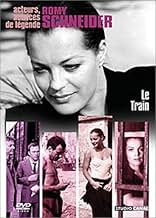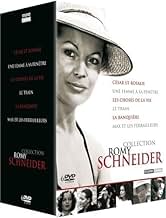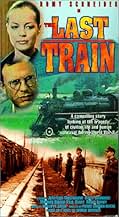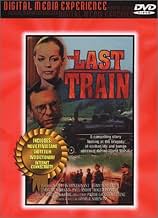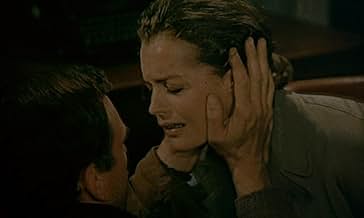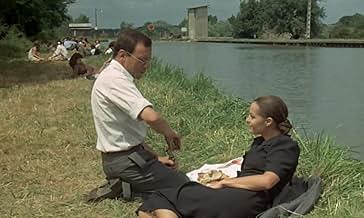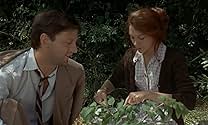Le train
- 1973
- Tous publics
- 1h 35min
NOTE IMDb
6,9/10
1,9 k
MA NOTE
Julien Maroyeur, un Français et Anna Kupferse, une juive allemande, se rencontrent dans un train alors qu'ils fuient l'armée allemande.Julien Maroyeur, un Français et Anna Kupferse, une juive allemande, se rencontrent dans un train alors qu'ils fuient l'armée allemande.Julien Maroyeur, un Français et Anna Kupferse, une juive allemande, se rencontrent dans un train alors qu'ils fuient l'armée allemande.
- Réalisation
- Scénario
- Casting principal
- Récompenses
- 1 nomination au total
Avis à la une
Unusual but not terribly compelling WWII drama almost wholly set aboard a train (transporting French people fleeing from the oncoming Nazi invaders). The film's core is the budding romance between fellow passengers Jean-Louis Trintignant (whose pregnant wife and young daughter are staying in a different compartment and eventually get 'lost' along the way) and Romy Schneider, a German-Jew war widow.
Despite a busy narrative - Trintignant stepping down at every station to ask for the possible whereabouts of his family, Schneider being picked on by a group of loutish passengers in view of her aristocratic airs (meanwhile, an ageing prostitute is all-too-willing to render her services free of charge in such hard times!) and for whom the usually meek Trintignant stands up, a rather underdeveloped subplot involving young single mother Anne Wiazemsky (then still married to Jean-Luc Godard), etc. - the tone of the film is too glum and the treatment too conventional to generate much audience involvement; that said, the interspersing of black-and-white newsreels of similar events from the era was an inspired touch and the scene in which the train comes under aerial attack from the Nazis, leaving numerous victims, is nicely handled (even if the moment when a couple are mown down while relieving themselves in an open field comes off as unintentionally funny!). Besides, the film has other virtues in the pleasant countryside photography of Walter Wottitz (an expert in WWII-based films, among them John Frankenheimer's THE TRAIN [1964] - which was actually filmed in France!) and a lush score from Philippe Sarde.
An interesting moment in the film occurs when Trintignat scoffs at Schneider's recounting of how the Nazis intended to exterminate the Jewish population, which gives credence to the notion that the world only became aware of the full extent of the Holocaust after the war was over. When the train arrives at its destination, Trintignant is re-united with his family (including a new-born son) - but not before having passed off Schneider as his wife to the Gestapo officials! At the end, however, when she's captured as a member of the Resistance they're somehow able to link her back to him and the couple are brought together for questioning...
Despite a busy narrative - Trintignant stepping down at every station to ask for the possible whereabouts of his family, Schneider being picked on by a group of loutish passengers in view of her aristocratic airs (meanwhile, an ageing prostitute is all-too-willing to render her services free of charge in such hard times!) and for whom the usually meek Trintignant stands up, a rather underdeveloped subplot involving young single mother Anne Wiazemsky (then still married to Jean-Luc Godard), etc. - the tone of the film is too glum and the treatment too conventional to generate much audience involvement; that said, the interspersing of black-and-white newsreels of similar events from the era was an inspired touch and the scene in which the train comes under aerial attack from the Nazis, leaving numerous victims, is nicely handled (even if the moment when a couple are mown down while relieving themselves in an open field comes off as unintentionally funny!). Besides, the film has other virtues in the pleasant countryside photography of Walter Wottitz (an expert in WWII-based films, among them John Frankenheimer's THE TRAIN [1964] - which was actually filmed in France!) and a lush score from Philippe Sarde.
An interesting moment in the film occurs when Trintignat scoffs at Schneider's recounting of how the Nazis intended to exterminate the Jewish population, which gives credence to the notion that the world only became aware of the full extent of the Holocaust after the war was over. When the train arrives at its destination, Trintignant is re-united with his family (including a new-born son) - but not before having passed off Schneider as his wife to the Gestapo officials! At the end, however, when she's captured as a member of the Resistance they're somehow able to link her back to him and the couple are brought together for questioning...
In th seventies,Granier-Deferre became the "cinema De Qualité " director par excellence ;more accessible and less pretentious than Claude Sautet after "Max Et Les Ferrailleurs " ,his career really began in the early sixties with two estimable movies with Jean Gabin ("La Horse" and "Le Chat"),he continued with craftsman works such as "La Veuve Couderc" or "Le Train" ,both Georges Simenon's books transferred to the screen.
It may explain the "detective story" ending,which may seem a bit irrelevant in a realistic movie,but it is saved by the talent of the two principals,Schneider and Trintignant,injecting more emotion into the scene than you might think possible.
This is an apt title,for most of the movie takes place on a train,a train full of people running away from the German armies in 1940 (the beginning recalls René Clément's "Jeux Interdits" (1952).The screenwriters made no bones about criticizing French cowardliness and selfishness;it was before "Lacombe Lucien" to be precise ;As the character played by Maurice Biraud remarks :"we're afraid,we are fleeing,so we don't fight each other,get it?" On the train,the characters are stereotypes,particularly the hooker played by Regine ,probably inspired by Maupassant's "Boule De Suif",the unwed mother (oddly portrayed by cerebral (who said tedious?) Anne Wiazemsky,two sex maniacs ("when I look at you (the whore),I look like a beast !- even when you don't!);the Jewish German (Schneider),the average man (Trintignant).
An user complained that this man in the street should leave his pregnant wife and his little girl for a while and sleep with the German woman:in a world gone mad,anything can happen ,it would never have happened,had this electrician continued his routine life .
Following René Clément's steps in "Jeux Interdits" ,GD smartly integrates black and white archives films which ,with a careful editing ,turn color when the director returns to his fiction.Which his predecessor was not able to do.
It may explain the "detective story" ending,which may seem a bit irrelevant in a realistic movie,but it is saved by the talent of the two principals,Schneider and Trintignant,injecting more emotion into the scene than you might think possible.
This is an apt title,for most of the movie takes place on a train,a train full of people running away from the German armies in 1940 (the beginning recalls René Clément's "Jeux Interdits" (1952).The screenwriters made no bones about criticizing French cowardliness and selfishness;it was before "Lacombe Lucien" to be precise ;As the character played by Maurice Biraud remarks :"we're afraid,we are fleeing,so we don't fight each other,get it?" On the train,the characters are stereotypes,particularly the hooker played by Regine ,probably inspired by Maupassant's "Boule De Suif",the unwed mother (oddly portrayed by cerebral (who said tedious?) Anne Wiazemsky,two sex maniacs ("when I look at you (the whore),I look like a beast !- even when you don't!);the Jewish German (Schneider),the average man (Trintignant).
An user complained that this man in the street should leave his pregnant wife and his little girl for a while and sleep with the German woman:in a world gone mad,anything can happen ,it would never have happened,had this electrician continued his routine life .
Following René Clément's steps in "Jeux Interdits" ,GD smartly integrates black and white archives films which ,with a careful editing ,turn color when the director returns to his fiction.Which his predecessor was not able to do.
... one of Hollywood's favourite blends. Luckily, this is not a Hollywood movie but a french one; luckily, its bitter realism wins over the sweet moving moments in one of the best-acted cinematic love stories ever. Romy Schneider and J.-L. Trintignant give a performance you won't forget even when you have forgotten most details and plot elements of this simple, but convincing film.
I saw the film especially as admirer of Romy Schneider. I was seduced , again, by her presence and the close ups serve , in beautiful way, this cause. Her Anne , defined by bad experiences, becoming part of a story of survive and one of love, proposing a manner to resist to pressures and fears, educated , in some measure, in some form, a simple man, losting, for a period, his family, is just fair.
A war film , a trip , in the womb of a train under attacks of Nazi airplanes, a splendid scene about persecution against Jews , a great portraits of characters and inspired - dramatic end.
A beautiful film about experiences, love, refuges and radical decisions . And admirable job of Romy Schneider and Jean Louis Trintignant.
A war film , a trip , in the womb of a train under attacks of Nazi airplanes, a splendid scene about persecution against Jews , a great portraits of characters and inspired - dramatic end.
A beautiful film about experiences, love, refuges and radical decisions . And admirable job of Romy Schneider and Jean Louis Trintignant.
10myschrec
May 1940. The Germans invade France and thousands flee on trains heading for safety. A man is separated from his pregnant wife and young daughter. He meets a woman on the train and protects her. She is a German Jew -- suspected by the French -- and wanted by the Nazis.
With actual footage from WWII, this film feels more like a documentary, which of course adds to the drama. The characters -- even the minor ones -- are well drawn and evoke sympathy. Romy Schneider -- a beauty in so many other films -- displays her incredible acting prowess. And Jean-Louis Trintignant, who became well known after "Z" (1969) and "The Conformist" (1970), is incredible: low-keyed, soft-spoken and poignant. Can two people fall in love so quickly? Under such dire circumstances that keep getting worse, this strange romance seems so real.
For the most part, this is not a Holocaust film ... nor a film about Nazi atrocities. But the fear of German aggression is palpable. One character tells another -- as they see the results of the German aircraft bombing: "Close your eyes, you'll never know it happened." This is what all refugees desire -- to escape and forget. But this is a film that doesn't want you to forget the prejudice, selfishness, and other horrors of war. But it also reminds you of the gentleness and humankindness.
"It's them. I'd recognize that sound anywhere." I am reminded of the Holocaust survivor who could not sleep for years because of the sounds she heard in her dreams/nightmares.
The last seven minutes are some of the most frightening and intelligent minutes dealing with the Holocaust even put on film The scene is fraught with danger and filled with possibilities. The ethical dilemma will generate hours of thought and discussion.
With actual footage from WWII, this film feels more like a documentary, which of course adds to the drama. The characters -- even the minor ones -- are well drawn and evoke sympathy. Romy Schneider -- a beauty in so many other films -- displays her incredible acting prowess. And Jean-Louis Trintignant, who became well known after "Z" (1969) and "The Conformist" (1970), is incredible: low-keyed, soft-spoken and poignant. Can two people fall in love so quickly? Under such dire circumstances that keep getting worse, this strange romance seems so real.
For the most part, this is not a Holocaust film ... nor a film about Nazi atrocities. But the fear of German aggression is palpable. One character tells another -- as they see the results of the German aircraft bombing: "Close your eyes, you'll never know it happened." This is what all refugees desire -- to escape and forget. But this is a film that doesn't want you to forget the prejudice, selfishness, and other horrors of war. But it also reminds you of the gentleness and humankindness.
"It's them. I'd recognize that sound anywhere." I am reminded of the Holocaust survivor who could not sleep for years because of the sounds she heard in her dreams/nightmares.
The last seven minutes are some of the most frightening and intelligent minutes dealing with the Holocaust even put on film The scene is fraught with danger and filled with possibilities. The ethical dilemma will generate hours of thought and discussion.
Le saviez-vous
- AnecdotesAs Granier-Deferre had been part of the Exodus (at the age of 13), he was able to add a lot of personal observations to his description of the flight (such as people remaining cheerful despite the tragedy of the situation, nuns picking flowers in a field during a bombing raid, ...)
- ConnexionsFeatured in Romy, femme libre (2022)
- Bandes originalesL'Attaque
Written and Performed by Philippe Sarde Et Orchestre
Meilleurs choix
Connectez-vous pour évaluer et suivre la liste de favoris afin de recevoir des recommandations personnalisées
- How long is The Last Train?Alimenté par Alexa
Détails
- Date de sortie
- Pays d’origine
- Langue
- Aussi connu sous le nom de
- The Last Train
- Lieux de tournage
- Saincaize-Meauce, Nièvre, France(mined railroad bridge)
- Sociétés de production
- Voir plus de crédits d'entreprise sur IMDbPro
- Durée1 heure 35 minutes
- Couleur
- Mixage
- Rapport de forme
- 1.66 : 1
Contribuer à cette page
Suggérer une modification ou ajouter du contenu manquant


